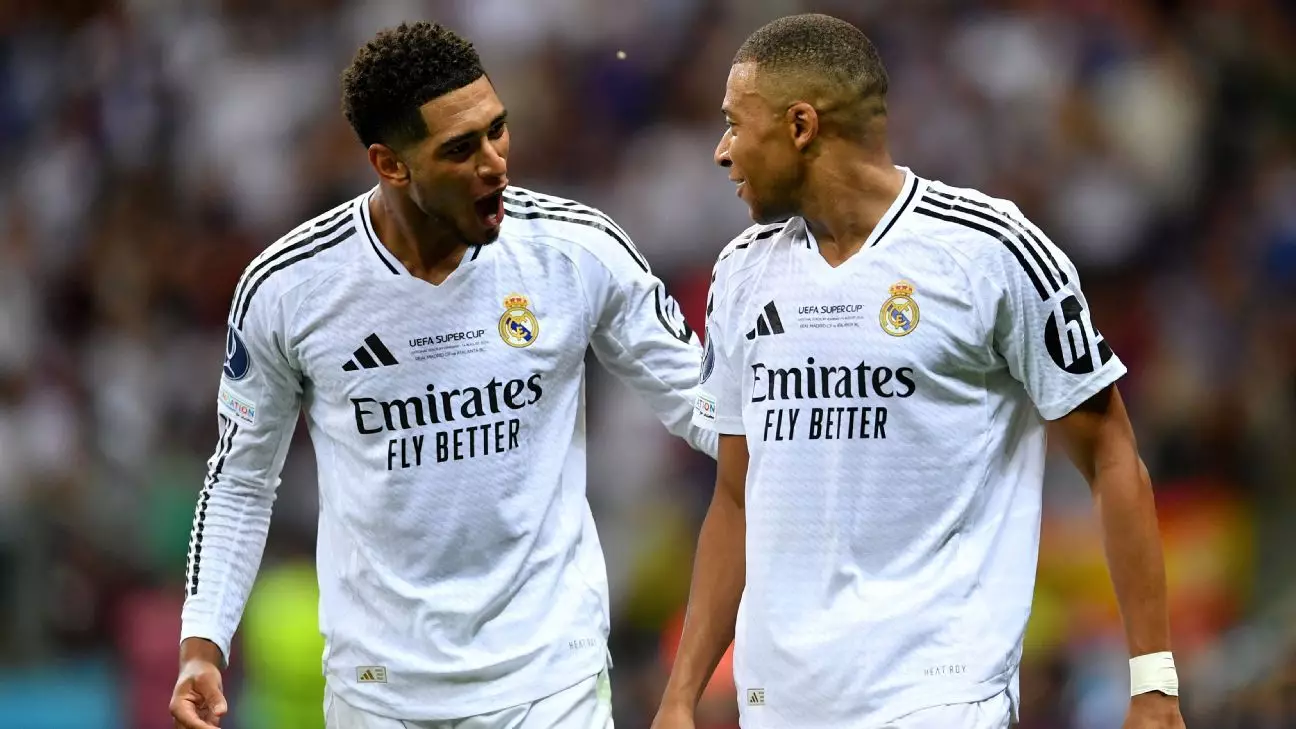In the world of football, where individual talent is often celebrated and scrutinized in equal measure, Kylian Mbappé’s recent decision to forgo a penalty kick for Real Madrid during a match against Getafe has sparked considerable dialogue about leadership and teamwork. Manager Carlo Ancelotti’s backing of Mbappé’s choice as an “act of altruism” rather than a sign of insecurity has opened a broader conversation about the values that underpin success within a team framework.
During the match, Mbappé found himself under intense scrutiny: he had scored only twice in the prior nine games. Adding to the weight of expectation, he had recently missed a crucial penalty kick against Liverpool in the Champions League. The 30th-minute penalty against Getafe presented an opportunity to redeem himself, yet, in a surprising turn, he allowed Jude Bellingham to take the shot instead. This moment served not only as a turning point in the match, with Bellingham converting and helping Madrid secure a 2-0 victory, but also as a pivotal instance of leadership that transcended mere statistics.
Mbappé’s choice to pass the responsibility reflects a deeper philosophical alignment with team dynamics. While some observers may interpret this as an indication of wavering confidence, Ancelotti argues that it illustrates a commitment to the team’s collective success over personal glory. This act resonates with the age-old debate about individualism versus collectivism in team sports, suggesting that sometimes the best leaders are those who step back to elevate their teammates.
Ancelotti’s comments following the match provide insight into his managerial philosophy and how he perceives leadership. He posits that football is not merely about stats—goals scored, penalties taken—but also about understanding and supporting each other within the locker room. When asked about possible penalties in future games, Ancelotti expressed that both Mbappé and Bellingham are capable takers, but stressed the importance of understanding the team’s dynamics over individual ambition. This reflection suggests that Ancelotti prioritizes emotional intelligence and camaraderie over raw talent alone, recognizing that a cohesive environment can lead to peak performance.
Despite the praise directed at Mbappé for his altruistic decision, it remains essential to address the ongoing critique surrounding his performances this season. Although he boasts eight goals in 13 La Liga matches, the pressure on him to consistently deliver spectacular results can prove taxing. It raises questions about how external expectations can influence a player’s mindset; the need to balance personal ambition with a cohesive team strategy becomes a fine line to tread. Equally, Ancelotti’s insistence on valuing altruism within the team also posits that great talent must be harnessed in service to a collective goal.
The focus on Bellingham is equally significant. After facing criticism of his own for an early-season goal drought, his current scoring prowess—having netted in his last three La Liga games—illustrates how recognition and trust from teammates can break mental barriers. Ancelotti argues that Bellingham’s improvement has been facilitated by a more dynamic team structure, implying that when stars like Mbappé contribute selflessly, it opens up avenues for others to thrive as well.
The relationship between players underlines the notion of mutual growth in football. When individuals elevate each other instead of competing for sole accolades, the team as a whole benefits. This relationship is notably evident in how Bellingham has capitalized on the spaces created by Mbappé’s movements, showcasing how one player’s willingness to serve the team can pave the way for another’s success.
As Real Madrid finds itself trailing behind Barcelona in the league standings, the emphasis on teamwork becomes increasingly vital. The upcoming matches will test whether these abstract concepts of altruism and cooperation can manifest into tangible results on the pitch. Ancelotti has reiterated the importance of player recovery, mentioning Aurélien Tchouaméni’s return from injury as a strategic advantage that could further enhance the team’s composition.
Kylian Mbappé’s decision during the Getafe match exemplifies a broader understanding of leadership in football that values selflessness over solo endeavors. This incident serves as a reminder that in the pursuit of team success, cooperation often trumps individual brilliance. As Madrid contenders navigate the remainder of the season, the lessons in altruism may very well dictate their journey toward success.

